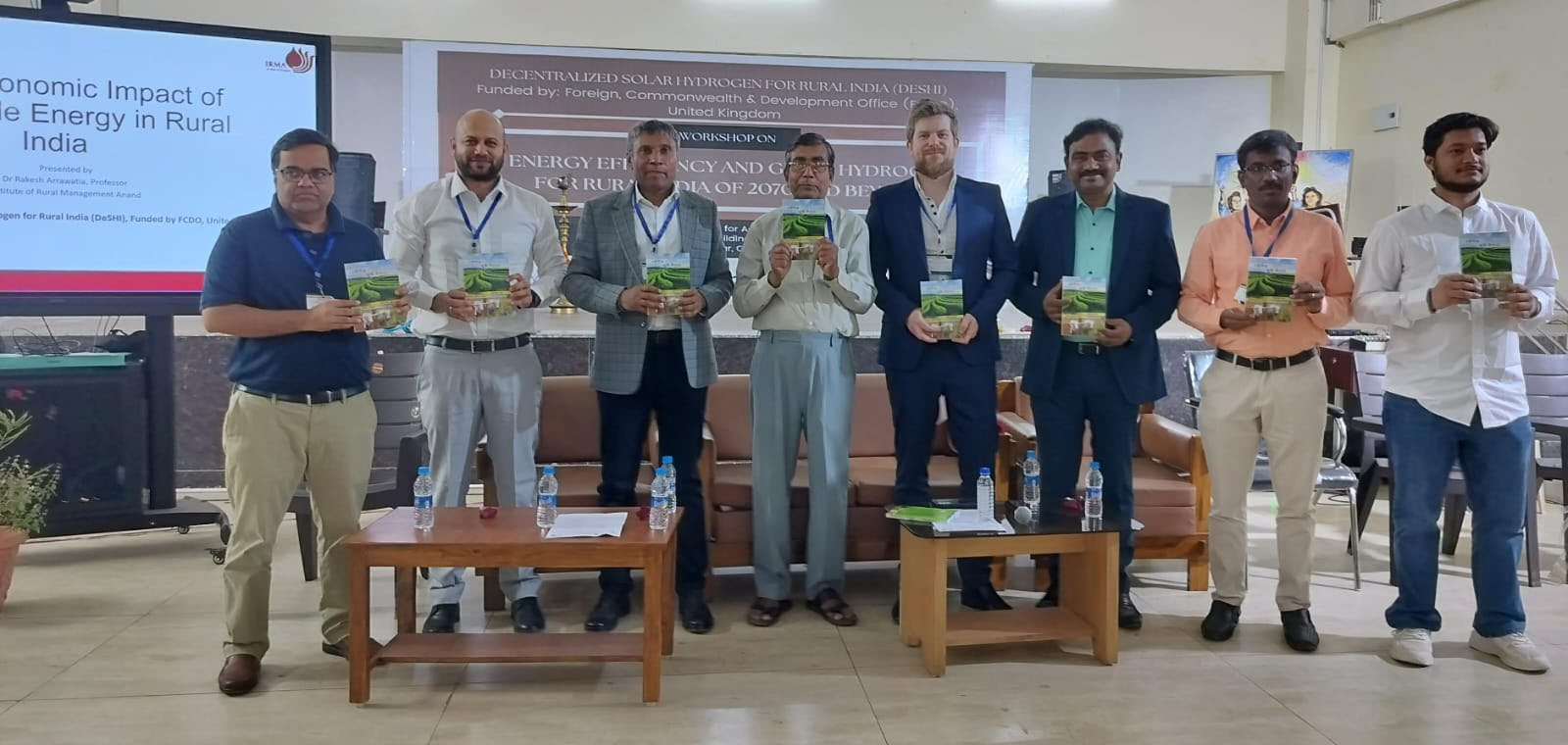Bhubaneswar: To tackle the challenges of air pollution (caused by about 60% share of fossil fuels in power generation, vehicles, rudimentary agricultural practices and industry), quality of power, energy poverty and rural-urban development disparity, India will have to consider, more urgently than ever, solar energy generated cleaner fuels and energy storage media such as hydrogen. To address the lack of robust transmission and distribution network in rural locations (>65% of India’s population lives in villages), it is imperative that village scale decentralized power generation systems assisted by dedicated mini-or micro-grids are deployed.
In this context, the DeSHI project led by Brunel University London (BRUNEL) in collaboration with Arktik Renewables and Energy Efficiency Pvt Ltd (ARKTIK) and Institute of Rural Management Anand (IRMA) is investigating the techno economic feasibility and societal impact of advanced solar photo catalytic and electrolytic hydrogen generators in rural India.
Informed deployment scenarios, performance parameters and industry perspective data is being employed to understand and evaluate the impact and disseminate project outputs. The potential generative impacts of solar hydrogen in supporting rural commercial, industrial and horticultural activities are being particularly accounted for..
Attended by more than 60 researchers, Academicians, Government, Corporate and NGO representatives, a Workshop on Energy Efficiency and Green Hydrogen for Rural India of 2070 and Beyond was organized at Utkal University on March 26th, 2024 The workshop was inaugurated by Prof ( Ms) Sabita Acharya, The Vice Chancellor, Utkal University During inaugural address she emphasized the use of Green Hydrogen in conjunction with other modes such as solar energy and wind energy, for round-the-clock renewable energy. Officials from Brunel University – Prof Harjit Singh, Overall Lead and Principal Investigator, DeSHI project, Dr Rakesh Arrawatia IRMA lead DeSHI project, Dr Ansul Paneri, Arktik, attended the meeting and addressed the gatherings citing good practices on solar hydrogen .
The officials had detailed discussions on the various potential options for using Green Hydrogen as a storage medium for supporting round-the-clock power and peak power demand. The meeting also discussed various mechanisms of providing Government support for such projects. The policy mechanisms being considered include one based on the Contract for Difference (CfD) methodology, which is based on the difference between the market price and an agreed “strike price”.
Shri Jagadananda, Member Secretary, CYSD gave recommendations to the officials to draft the scheme guidelines, based on the economics, technologies and current and future market conditions of the green hydrogen and power sector. Dr. Avaya Nayak, the Former Register Utkal University and Retd Special Secretary Government of Odisha and Chairman TITE Engineering College graced the occasion as one of the Guest of Honour .
Mr. K.C. Mishra, Ashoka Fellow and Director E- Kutir underlined the growing power demand and the importance of round-the-clock renewable energy in reducing the cost of renewable energy and making it affordable.
Prof Benudhar Bhuian, Advisor, Centre for Agri Management (CAM)- Utkal University informed the participants that Researchers around the world are working on more efficient methods for producing hydrogen. Hydrogen could make a decisive contribution to reducing the consumption of fossil raw materials, especially if it is produced using renewable energies. Existing technologies for producing climate-neutral hydrogen are still too inefficient or too expensive for broader application..
Others who spoke on the occasion were Dr. Manoranjan Mishra, Director- Jeevanrekha Parishad (JRP0, Mr. Deepak Ram, Director, CAM,Dr. Nathen, School of Chemistry and Chemical Engineering , Queen,s University , UK,Dr. Vivekanathan, Vice President , Hild Electric, Chennai,Prof. Suresh, NIT, NewDelhi, Prof S.N. Naik , IIT, Delhi , Mr. Aman Dhiman,Brunel University. The workshop concluded with a decision to develop a joint Research project involving Brunel and Utkal University, IRMA and Jeevan Rekha Parishad .


